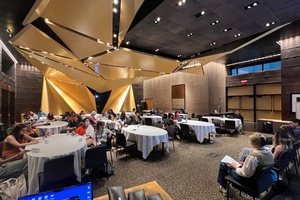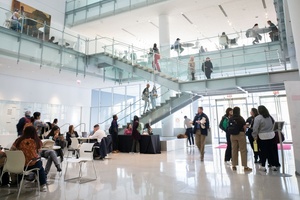Features:
Apply to join the Covering Science Slack community
“Supporting local reporters and editors who want to cover science.”

Science intersects with virtually every aspect of society, from public health to city planning to social justice. Yet the journalists on the frontlines of covering these issues—local and general assignment reporters—say they often feel ill-equipped to report on science. Meanwhile, many journalists who truly consider science their beat work within their own silos, serving audiences that purposely seek out science, often at specialized, niche outlets. This setup widens the separation between science journalism and local journalism, to the disservice of both reporters and their readers.
The Open Notebook is working to bridge that gap. We have an application open now through February 8 to join the Covering Science Slack community, a free peer mentoring group to support local and general assignment journalists who do not think of science, health, or environmental reporting as their beat but want to develop their skills and confidence in weaving science into their stories.
Gathering a dispersed community
The decision to host this community on Slack stemmed from the input of local reporters themselves. We began by interviewing local journalists from local and regional newspapers, TV and radio stations, and online outlets to learn more about the barriers they face in covering science. Conducting these interviews in 2021 was especially timely, as many local reporters were grappling with keeping tabs on COVID-19: “I think most journalists got thrown into science writing this year, and it became very obvious that most of us don’t know what we’re talking about,” one interviewee said.
In those conversations, one of the primary needs local journalists expressed was for a collaborative place to seek and receive timely support in finding expert sources, getting up to speed on a topic, vetting scientific studies and claims, and wading through statistical analyses. “To really say anything especially meaningful or authoritative about a big topic, like opioid dependence, you need to have some bigger understanding of the body of work and who the experts are,” one reporter we spoke to told us. “It’s a really tricky thing to be able to just jump into a topic and have some idea of the bigger picture of that topic.” These are the kinds of tasks science journalists encounter on a daily basis, but they don’t necessarily have connections with their peers at local outlets to be able to offer them guidance.
Taking those early conversations into consideration, we ran a 12-week pilot version of the TON Covering Science Slack in 2022, with support from a seed grant from the Science Literacy Foundation. After a two-week application process, we selected about 30 staffers and freelancers at local and regional publications across the country including newspapers, magazines, online outlets, and TV and radio stations. We also hired a group of five experienced science journalists from a variety of specialties to play a mentoring role in this community.
Setting up the Slack space
In structuring our Slack community, we took inspiration from existing journalism Slack communities that we’re part of and admire for their supportive culture and sense of organization, including Open News’ DEI Coalition For Anti-Racist, Equitable, And Just Newsrooms and Covering Climate Now. Our community is built around a number of separate channels dedicated to different challenges and needs that journalists may encounter in covering science.
Some of the channels we setup specific to covering science included:
- #seeking-sources - a place for community members to connect one another with scientific experts or resources on topics such as the effects of psychological pressure on youth athletes, lead water contamination, and the relationship between snowpack and climate change
- #sciwri-craft - a place to discuss nuanced topics on the craft of science writing, such as about how to cover unfolding science, conduct interviews on touchy subjects, and avoid hackneyed science metaphors (a scientific inquiry likened to a quest for the Holy Grail! DNA described as the ‘building blocks of life’! Another day, another ‘game changing’ discovery!)
- #pitch-workshop - a place for freelance participants to seek and receive feedback on science-related pitches. Some of these discussions led to reporters landing assignments at publications such as The Washington Post and Discover.
Expanding the Slack
Now, with support from the Burroughs Wellcome Fund, we are gearing up to launch an expanded version of the Covering Science Slack community. Over the next few months, we plan to increase the size of our membership to include dozens of journalists from newsrooms across the U.S.
In the Slack now are reporters who come from a variety of backgrounds, including a former reporter for a small town newspaper who is working their way into environmental journalism, NPR affiliate station reporters covering climate change and COVID-19, and journalists who cover other beats, such as anthropology, parenting, and music. But we know this is just a small subset of the diverse population of reporters and editors we aim to support: those who work for outlets serving local audiences and for general-interest publications that might not have a dedicated science desk.
We’ll also expand the scope of learning opportunities available through this program, by offering guided Slack discussions and webinars centered on core challenges of covering science, and by holding informal virtual gatherings for community members. Our hope is to grow this space into a sustainable community where journalists and editors who work for a variety of media outlets—large and small, urban and rural, commercial and nonprofit—gather to exchange ideas and support each other’s work.
If you are interested in joining this Slack community or know of a local or general assignment journalist who might be, we’d love to hear from you! Please fill out or share this short application by February 8. (There is no cost for journalists to participate in this program.) You can also contact The Open Notebook’s managing editor and Covering Science Slack community manager Rachel Zamzow at rachelzamzow@theopennotebook.com.
Organizations
Credits
-
 Siri Carpenter
Siri Carpenter
Siri Carpenter is co-founder and editor-in-chief of The Open Notebook. She is the editor of the book, The Craft of Science Writing. She is also an award-winning science journalist and editor whose writing and editorial work has appeared in The New York Times, Science, Discover, Scientific American, and many other publications. She lives in Madison, Wisconsin.
-
 Rachel Zamzow
Rachel Zamzow
Rachel Zamzow is the managing editor of The Open Notebook. She is also an award-winning science journalist. She writes features and news stories for the autism research news site Spectrum among other publications. She lives in Waco, Texas.



